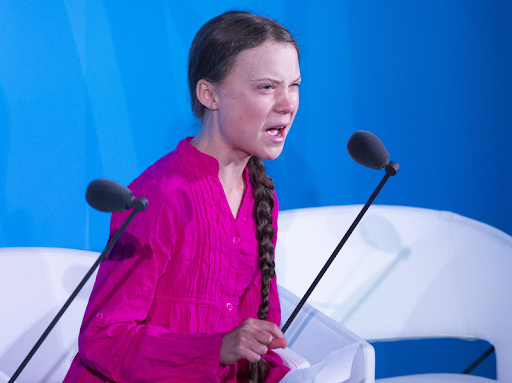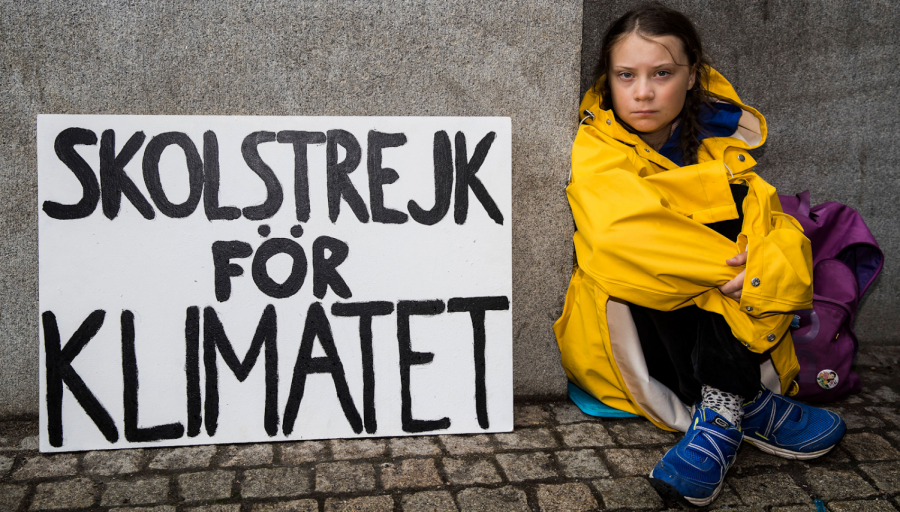The Greta Effect
“The world is waking up. And change is coming, whether you like it or not.”- Greta Thunberg
A year ago, Greta Thunberg protested climate change alone. Today, she stands with millions
Throughout the years, activism have taken different forms. Martin Luther King Jr. marching through the streets of Washington. Rosa Parks choosing to be arrested rather than give up her seat aboard a city bus. Nelson Mandela risking his life to spread messages of equality across the world.
The thread joining these lives and legacies is a desire to bring to light injustice and improve the world. In 2019 the world witnessed the emergence of another activist. Greta Thunberg, a 16 year old environmentalist with Aspergers who has drawn the attention of millions.
Greta Thunberg’s incredible journey from solitary protest to a national stage began in August of 2018. She sat alone outside of the Swedish Parliament building holding a sign reading “Skolstrejk For Klimatet” (School Strike for the Climate). Pictures of her spread quickly through social media. Soon, students from around the world were protesting as well. On September 20th, in more than 150 countries, nearly 4 million people protested, most of them students.
Last week, Greta attended the United Nations Climate Summit in New York City, sparking nationwide attention. She arrived in New York last month after a 15 day voyage across the Atlantic Ocean. The trip was carbon neutral to support her beliefs of the importance of reducing carbon emissions. At such a young age, Greta has proven that standing up for your beliefs is of the utmost importance, even if you have to make sacrifices. Greta is giving up part of her education, stating that she should be in school in Sweden, as she takes a stand for the importance of protecting the environment.
Greta’s activism is bold and brave, but that does not mean she is invincible to criticism. Some adults have tried to overshadow her work with claims that she is being manipulated by her parents, a hypocrite, and is mentally ill.
The comment that gained the most media attention was by a Fox News guest who called Greta a “mentally ill Swedish child” numerous times on the air. Greta has been diagnosed with Asperger’s syndrome, a condition that places her on the autism spectrum, but she calls it her “superpower”. She has said that she only speaks when absolutely necessary, which makes her involvement in the climate movement even more extraordinary, as she travels the globe leading protests and giving speeches.
Donald Trump even seemed to mock her on Twitter writing, “She seems like a very happy young girl looking forward to a bright and wonderful future”. During her speech at the UN, she was very emotional, on the verge of tears, screaming at the adults who have robbed her, and everyone of this generation, of a future.
Students at NA, and around the country are motivated by Greta’s fearlessness.
Cate Maldia, a freshman at NA stated, “Greta shows that we don’t have to be quiet out of fear that people are going to judge you.” When asked if she would give up a day or two of school to stand up for what she believes, Maldia responded, “I would do that because the world is a greater cause than my individual self.”
Greta’s extraordinary story fits within a larger narrative of teenagers and young adults as vehicles of social change and advocacy. Students around the globe must put their education to better use. Most students cram for tests last minute and simply regurgitate information that is fed to them by their teachers. This is extremely prevalent in our own extremely competitive school district and schools around the world.
The constant pressure to get good grades, take high level courses, participate in sports, and maintain a social life is draining. Students feel that they must get good grades to feel validated and be comparable to their peers. We should change our perspective from getting a passing grade, to focusing on relevant issues that match with a students interests. Students instead must mobilize and use their education to learn about what is important to them.

Grade chasing will not get students anywhere. Speaking their mind and ideas and leading the next generation into the future will. In the United States in particular, education is treated as a “job”, that must be done to get it over with. But it can be much more than that. Educational opportunities and more individualized learning can help students to be informed on real issues that they will face so that they can make a difference in an ever changing world.
Greta represents the next generation of activists. With fiery words and bold ideas, teenagers and young adults are mobilizing behind causes that matter to them and fighting for their lives and futures. School and good grades are important, but it is also vital to keep everything in perspective and to pay attention to more global issues at hand.
Greta Thunberg’s story also shows the world the incredible impact that one individual can have. Her story is a testament to what can be accomplished with persistence and passion.
One year ago, she sat by herself. Today, she stands with millions.

Emma Scott is in 10th grade and this is her first year writing for NAEye. Outside of school, she likes arguing with people at speech and debate tournaments...

Virginia Lucas is currently a sophomore at North Allegheny Intermediate High School. Outside of NAI, she has done work in journalism at the Carson Middle...



Ryan Nash • Oct 7, 2019 at 1:44 pm
Its important to note the as of 2013 Asperger’s Syndrome is no longer a disganosibly condition going by the DSM-5 manual and is instead diagnosed soleo as High Functioning Autism, but some people with the condition still call it Aspergers though it isn’t used by psychiatrists
https://www.ncbi.nlm.nih.gov/pmc/articles/PMC4725185/
Striaghtcappin • Oct 4, 2019 at 4:05 pm
Let’s take advice from a 16 year old she seems qualified!